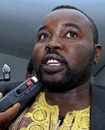Darfur rebels accuse govt of fresh attacks
By Opheera Mcdoom
CAIRO, Aug 26 (Reuters) – Rebels from Sudan’s Darfur region on Thursday rejected calls to disarm their fighters before a political solution to the 18-month conflict is reached and accused the government of fresh attacks against civilians.
 Leader of the rebel Sudan Liberation Movement (SLM), Abdel Wahid Mohamed Ahmed al-Nur [photo], said government forces backed by Arab Janjaweed militias had attacked two days ago in the village of Yassin, about 100 km (60 miles) east of Nyala in Southern Darfur state, killing 57 civilians.
Leader of the rebel Sudan Liberation Movement (SLM), Abdel Wahid Mohamed Ahmed al-Nur [photo], said government forces backed by Arab Janjaweed militias had attacked two days ago in the village of Yassin, about 100 km (60 miles) east of Nyala in Southern Darfur state, killing 57 civilians.
On Thurdsay morning, he said, government planes and helicopter gunships had bombed Hashaba village, west of El-Fasher in Northern Darfur state, killing three people.
Sudan denied the accusation.
“It is not true the rebels were attacked since they were the ones who were fighting,” said Majzoub al-Khalifa Ahmed, agriculture minister and chief negotiator in Abuja talks.
At African Union-mediated peace talks in the Nigerian capital to end 18 months of revolt in remote Darfur, Sudan’s government agreed to enlarge an AU force to help garrison Darfur rebels while Sudanese armed forces disarm Arab militias.
Sudan has agreed to about 300 AU forces in Darfur to protect more than 100 observers of a shaky April ceasefire.
But rebels said they would not disarm until after a political solution, including devolution of power and wealth-sharing, is agreed and implemented in Sudan’s arid west.
“This is impossible. No rebel movement can accept to disarm before a political settlement,” said Bahar Idriss Abu Garda, secretary-general of the rebel Justice and Equality Movement (JEM), speaking by telephone from Darfur.
“And we must be clear, not just after political agreement but after it is achieved — whether it be one year, however long it takes,” Garda said.
He added his movement would either be disarmed by a multilateral international force or integrated into Sudan’s armed forces.
Nur, the leader of the other Darfur rebel group, the SLM, said his movement would not disarm at all.
“This is incongruent. We will not disarm our army at all and this is something that’s not negotiable,” Nur told Reuters from the talks in Abuja.
Both movements said the Janjaweed, who they say the government has armed to loot and burn African villages in a campaign of ethnic cleansing in Darfur, must be disarmed first.
Sudan admits having used militias to combat the rebellion, but denies links to the Janjaweed, which it calls outlaws.
The United Nations estimates the fighting has displaced more than one million people with 200,000 refugees encamped in neighbouring Chad, creating the world’s worst humanitarian crisis. Up to 50,000 people have been killed since fighting began.
DARFUR ATTACKS
He and Abu Garda said they were seeking a solution for Darfur similar to one agreed in the Kenyan town of Naivasha on ending 21 years of civil war in Sudan’s south.
The Naivasha accords contain principles of devolution of power and the sharing of Sudan’s recently discovered oil wealth. Sudan’s main oil fields are in the south. No oil has been discovered in Darfur, but analysts say there could be reserves.
Abu Garda said his movement would not accept for Darfur the limited degree of autonomy agreed in Naivasha for three areas in central Sudan, as suggested by the government as a possible political settlement in Darfur.
“(Darfur) is marginalised politically and economically so it should be (solved) like Naivasha for the south not for the three areas,” he told Reuters. “(We want) the devolution of power and resources.”
The Darfur rebellion followed years of low-level conflict between Arab nomadic tribes and mainly African farming communities over scarce resources.
